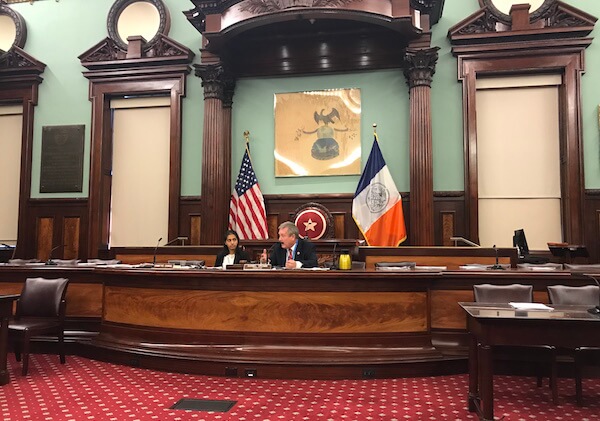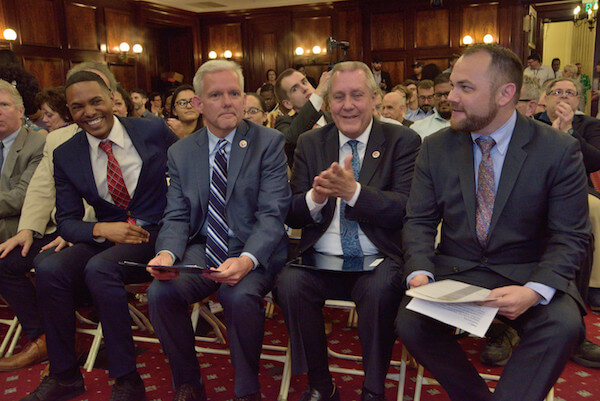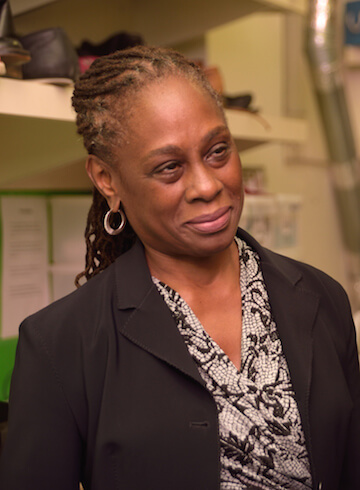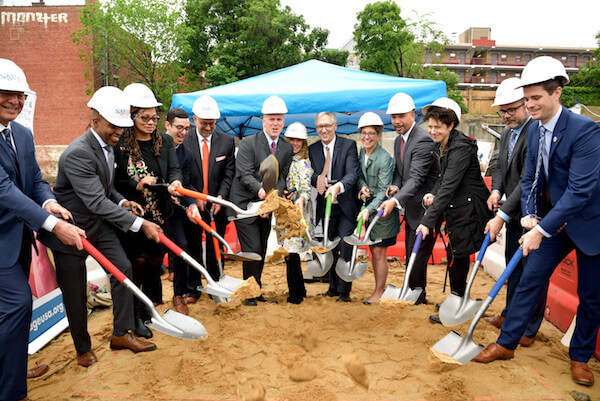Students testifying at the City Council Committee on Education hearing on bullying on October 30. | ANDY HUMM
Out gay City Councilmember Daniel Dromm of Queens, on October 30, presided over a hearing of the Committee on Education he chairs that heard more than six hours of testimony on bullying in the city public schools, with representatives from the Department of Education (DOE) on the defensive and students and advocates calling for a radical overhaul in the way this public health crisis is fought. (Video of the entire session can be viewed here.)
In his opening remarks, Dromm, a former grade school teacher in his home borough, said, “Most textbooks do not mention LGBTQ contributions, offer no LGBT role models, and make LGBT people invisible. This must end! Anti-bullying education is worth nothing unless the lesbian, gay, bisexual, transgender, and queer words are used at every grade level.”
He added that it was “unacceptable” that LGBTQ issues can only be brought up “at certain times.” And he decried the fact that students being bullied for being LGBTQ or thought to be so “often cannot tell anyone, especially if there is no visible supportive LGBTQ person.”
Parents, students, advocates warn schools failing to address rampant bullying
“Bullying, harassment, and discrimination can have long-lasting negative effects on students,” said Council Speaker Melissa Mark-Viverito, “but the issue is particularly challenging for certain populations such as LGBTQ students, English-language learners, and students with disabilities.”
Throughout the day, students of color and their parents in particular spoke of a school system in which their lives and cultures are not valued or taught about, leaving them more vulnerable to bullying. Mireya Solis, the mother of a fourth grader, said, “I don’t want my child to be bullied because of his/ her skin color or told to go back to their country. I want my child to feel like they belong and are part of the community.”
Julian, a youth leader at the social justice group Make the Road, said, “We need teachers who are trained to teach and support students of color who come from various economic and racial backgrounds and identify as LGBTQ, gender non-conforming, and have disabilities… Having a culturally responsive education would help everyone feel valued and represented.”
Elizabethe Payne, director of the Queering Education Research Institute, cautioned, “Bullying behaviors are not anti-social but rather social acts that maintain the peer boundaries for normal and acceptable within a peer context.” She explained that “proposed solutions have failed to consider how educational institutions assume and/ or expect heterosexuality and gender conformity of all students and thus limit possibilities for exploring why LGBTQ youth are so vulnerable. Consistent intervention is critical, but it is not enough.”
Nancy Ginsburg, director of the Legal Aid Society’s Adolescent Intervention and Diversion Project, said, “We are failing [our children] because we have been slow to recognize and take into account the stressors associated with prolonged exposure to poverty, violence, and substance abuse. While we are willing to commit resources to law enforcement, we need to do the same for quality health and mental health care.”
Among parents testifying, many were from communities of color. | ANDY HUMM
The hearings were called in response to the September 27 incident at the Urban Assembly School for Wildlife Conservation in the Bronx, where Abel Cedeno, a relentlessly bullied gay teen, told Gay City News that he snapped as he was attacked in a classroom and defended himself with a knife, killing Matthew McCree and wounding Ariane Laboy. Cedeno has been charged with manslaughter, and his next court date is November 15.
The New York Times reported that a 12-year-old boy with long hair at the same school was bullied and isolated so badly, including being labeled as gay even though he said he was not, that he tried to hang himself with his sweater. That boy and his grandmother guardian complained repeatedly to the school and not only was nothing done about it, the bullying got worse as a result. Now — at the city’s expense — he goes to a private school where, he told the Times, “They treat me like I’m someone.”
The lead witness at Dromm’s hearing was Schools Chancellor Carmen Fariña, who announced $8 million in new funding to enhance anti-bullying programs in the schools and other initiatives. Her department is being sued for $25 million by McCree’s family, whose attorney, Sanford Rubenstein, was called to testify at the hearing and decried the fact that metal detectors were not in place at McCree’s school despite being requested by the principal. He also criticized the DOE’s failure to enforce the anti-bullying Dignity for All Students Act (DASA) — state legislation requiring that incidents of bullying, harassment, and violence be reported and combatted.
Dromm argued with Rubenstein about the value of metal detectors, and the students who testified said it made them all feel like criminals. Don Kao, the veteran leader of Project Reach Youth, testified, “What we really need are detectors for racism, sexism, and homophobia.”
“Metal detectors don’t get at the root causes or prevent conflicts and don’t teach students anything,” Dromm said, “other than that they can’t be trusted.” He and many students and advocates, led by those from Make the Road, called for more “Restorative Justice” programs that are being field-tested in a small number of schools.
Onyx Walker of the Urban Youth Collaborative said, “We don’t need double the number of school safety personnel than guidance counselors in schools” and called for at least one guidance counselor per 100 students in “underserved schools.”
Gena Miller, an attorney at Advocates for Children of New York who represents LGBTQ and disabled students who are bullied and does “know-your-rights” trainings on bullying for parents, students, and staff, called for “whole-school trainings in Collaborative Problem Solving and Restorative Practices to promote a positive school climate and supportive, inclusive learning environments where bullying is prevented and appropriately addressed.”
Dromm said, “Giving students an opportunity to express their views and perspectives on conflicts and issues that arise, having their voices truly heard by adults and students alike, and holding them responsible to repair any harm their actions may have caused can truly be transformative.” He cited schools in Manhattan such as the Earth School, the East Side Middle School, and LaGuardia High School as places where the Restorative Justice model works.
Councilmember Daniel Dromm, the out gay committee chair, was the only member to hear all six hours of testimony. | ANDY HUMM
The schools have lots of policies and procedures in place ostensibly to curb bullying — including Respect for All coordinators in every school. But as witnesses at the hearing testified, few students know who that coordinator is in their schools. Dromm’s Intro 1538 would require the DOE to put the names and contact information for all Respect for All coordinators on its website “for the reporting of bullying or bias-based incidents” — and compel each individual school website to do the same.
One of the biggest complaints from students and parents is that their reports of bullying are not dealt with effectively, if at all, and that making a report of bullying puts the student at further risk. Fariña announced that an online “Bullying Complaint Portal” is being developed, but that it would not be up and running until 2019. At present, the DOE advises students and parents to report incidents to the Respect for All coordinator at their school or via email to RespectForAll@schools.nyc.gov, which is monitored by the Office of Safety and Youth Development.
The current statistics on bullying are astounding — not because they show it to be rampant, but because there are so few “material incidents” reported to the State Department of Education as required under DASA. In the 2016-17 school year, Fariña said, a total of 3,281 such incidents were reported. Many schools reported none. Overall, the statistic works out to fewer than two incidents per school per year — indicative of alarming underreporting. Dromm cited the DOE’s own 2017 Teacher Survey that “revealed that more than 50 percent of teachers at more than 400 schools indicated that students at their schools harass, bully, or intimidate students some or most of the time. In what other working and learning environment would such a climate be acceptable?”
Becca Mui, education manager of GLSEN, said, “Of the LGBTQ students surveyed in New York, 65 percent had faced harassment on the basis of sexual orientation and 50 percent on the basis of gender expression” and that “most never reported the incident” and of those who did, “only 33% said it resulted in effective staff intervention.”
Fariña acknowledged “the fear of reporting,” but also said many of these incidents “happen out of the vision of school officials.” She also said the “material incidents” reported to the state have to meet “a higher bar — something that causes physical injury or emotional harm.” But the stats don’t seem to get at the many students who absent themselves from school because of bullying — Cedeno was one last year — or who fall into deep depression over it, deeply affecting their ability to learn.
Dromm pressed Fariña on making LGBTQ issues more visible in the schools through posters, Out for Safe Schools badges worn by teachers to indicate they are safe to talk to about LGBTQ issues, and advising teachers and administrators to integrate LGBTQ references into their presentations.
The committee did pass Intro 1638 that requires the DOE “to report, for each middle and high school, whether such school has a gay-straight alliance or gender-sexuality alliance (GSA); the number of teachers and administrators who have received trainings related to supporting lesbian, gay, bisexual, transgender, queer or questioning, and gender non-conforming (LGBTQGNC) students; and a narrative description of the training offered by the department to support LGBTQGNC students, including whether any such training includes training related to GSAs.”
The measure passed the full Council the next day, with one dissent from Chaim Deutsch and an abstention from David Greenfield, both Orthodox Jewish councilmembers from Brooklyn. Greenfield, who is leaving the Council to run the Metropolitan Council on Jewish Poverty, has devoted much of his public life to securing taxpayer funds for private and religious schools.
Fariña pledged funding of $1 million for the development of new student-led GSAs and Respect for All clubs. Middle and high schools can apply for the funding.
Jillian Weiss, director of the Transgender Legal Defense & Education Fund, submitted testimony saying, “After 30-plus years of being a lawyer and two decades as an advocate, I know from my experience that victims of bullying and discrimination often do not know where to turn,” leading to “severe emotional distress.” She called for more visibility and training for Respect for All coordinators.
Donna Lieberman, executive director of the New York Civil Liberties Union, made extensive recommendations, concluding that “the DOE must do more not only to respond to incidents of bullying, harassment, and discrimination in the schools, but also put in place proactive measures such as increased training, visibility, accountability and support, and funding to support a positive school climate.”
Jared Fox, who is the sole DOE staffer charged with coordinating LGBTQ issues in the schools for its 1.1 million students, was the only representative of the DOE who stayed for the entire hearing. And Dromm was the only councilmember to hear all six hours of testimony.
After she testified, Fariña, who said she has been to the Urban Assembly school four times since the deadly Cedeno-McCree incident, would not acknowledge whether McCree’s alleged membership in a local gang played any role in Cedeno’s fear of McCree and Laboy, boys who he said had not bullied him personally before but whom he knew to be gang members and who had bullied a friend of his. She cited the investigation at the school by the special commissioner of investigation as her reason for not answering. But there are reports from the school that many student witnesses to the conflict and friends of Cedeno are being intimidated by gang members to prevent them from speaking up about the bullying Cedeno endured and corroborating his claim to be acting in self-defense. There are also reports that the teachers fear many of the students.
McCree family lawyer Rubenstein also denied knowledge of whether McCree was a member of a gang.
Out gay Councilmember Ritchie Torres of the Bronx complained to Fariña about the DOE’s “lack of transparency” in the Cedeno case. “Most of what I find out is from the press, not the DOE,” he said.
Upper West Side Councilmember Mark Levine said that when a child who is supposed to be monitored by the Administration for Children’s Services (ACS) dies at the hands of abusive parents, “the city treats it as a crisis and does an exhaustive investigation,” which is not the case with bullying in the schools. He said he saw homophobia from children in his own kids’ school and remembered it from his days as a teacher. “It is treated as part of childhood banter,” he said, something that needs to end if LGBTQ kids are going to be safe. Fariña said she would address these concerns specifically in letters to teachers and parents.
Rachael Morgan Peters, New York executive director at the Peer Health Exchange, testified that “effective health education can play a strong role in dispelling myths about sexual orientation and gender identity and can build safe spaces for learning and respect, critical pieces to combat bullying.” But, she noted, a “recent report by Comptroller Scott Stringer shows that the DOE is not providing comprehensive health education — as required by state law — to all middle and high school students, and is not prioritizing sex ed as part of a larger health curriculum.” She praised the Council for forming a sex ed task force and looks forward to “progressive and bold recommendations.”








































